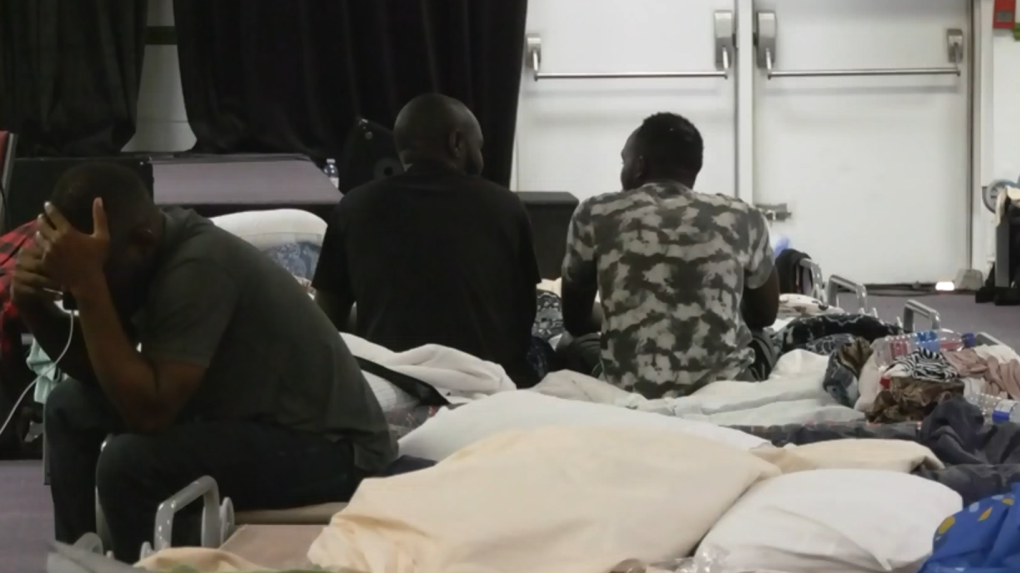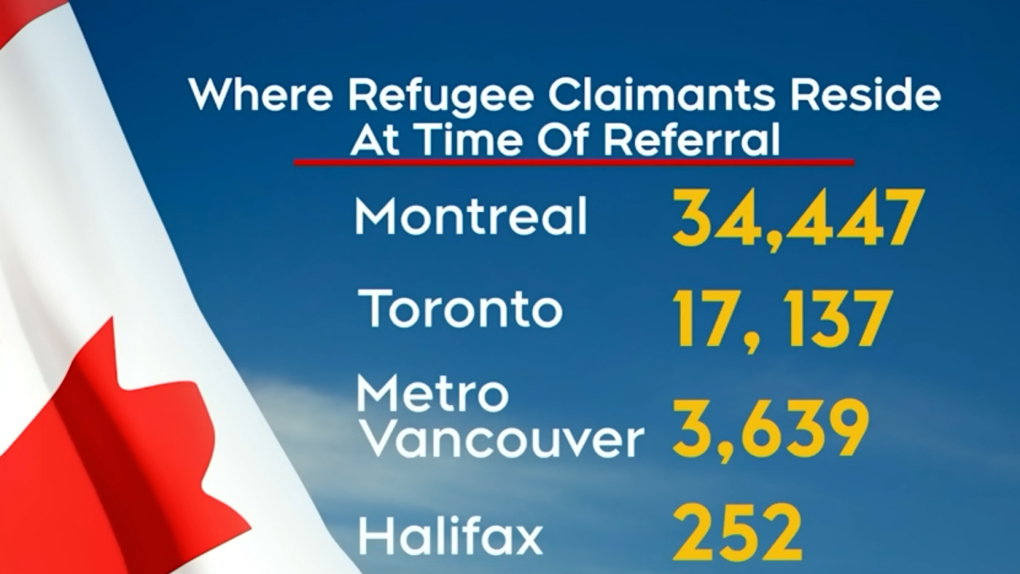Groups open to finding housing for Toronto refugee claimants across Canada
Community groups are pushing for a long-term solution to avoid the shelter crunch that had stranded asylum seekers on Toronto streets amid a funding standoff — and some are even open to flying claimants across Canada to where there may be housing and opportunities.
As the City of Toronto ramps up its shelter capacity, and roughly 300 refugee claimants stay overnight at two Toronto churches, there’s a huge need for volunteers to help get them into a process to determine their refugee status and also get work permits and income to support themselves, said Okie Eghobor of the Nigerian Canadian Association.
“We are calling the expats, the social workers, the nurses, the doctors, especially the lawyers within the African community. We are appealing to you please, we need your assistance now,” Eghobor said in an interview at Dominion Church International on Shepherd Avenue, where about 100 refugee claimants are sleeping.
“There’s a lot that needs to be done for the community. Whatever we are doing now is a temporary measure, and we want a permanent solution to the crisis,” he said.
Among the claimants is 41-year-old Ronnie Lugonja, one of several who has told CTV News Toronto he fled Uganda after a law passed there earlier this year made being gay illegal, with the death penalty for something called “aggravated homosexuality”.
“If you are caught there you are imprisoned, even penalized for it. We had to run for our lives,” he said in an interview.
He arrived in Canada on July 6 and found himself sleeping on the street, turned away from city shelters thanks to a decision to exclude asylum seekers that was reversed when the federal government provided a $97-million funding injection to the city.
He said in comparison to that he feels “fortunate” that he has a cot on the church floor. Lugonja said he flew to Toronto because it’s a “good city” — but said he would be open to moving to anywhere in the country for a job.
“I believe the whole of Canada is a free country, right?” he said.
 Refugee claimants sleeping at a church in Toronto amidst a shelter crunch.A federal program for another group of migrants at Roxham Road in Quebec housed thousands of people in hotel rooms, after the governments there said its capacity to absorb them was overwhelmed.
Refugee claimants sleeping at a church in Toronto amidst a shelter crunch.A federal program for another group of migrants at Roxham Road in Quebec housed thousands of people in hotel rooms, after the governments there said its capacity to absorb them was overwhelmed.
Figures provided by the federal government say refugee claimants are now housed in 751 rooms in 10 hotels in Quebec, and 2737 rooms in 17 hotels in Ontario, with the lion’s share in Niagara Falls.
Transfers to the Atlantic provinces began on February 18, with 481 asylum seekers shipped there so far, including 163 to Halifax, 79 to Fredericton, 134 to Moncton and 105 to St. John’s, the figures say.
Transfers to Vancouver, B.C., began on June 13 and 142 people have been sent there, the figures say.
“These are all claimants who arrived in Canada between ports of entry, at Roxham Road, in Quebec,” Citizenship and Immigration Canada said in a statement.
“While these irregular arrivals have significantly reduced since March 25, 2023 with the implementation of an updated Safe Third Country Agreement, the high volume of arrivals before this date placed pressure on publicly funded services and accommodation in Quebec. To help reduce these pressures, IRCC worked with other provinces and municipalities to identify new destinations that have the capacity to accommodate asylum seekers.”
 Where refugee claimants reside at time of referral (Immigration and refugee board). The idea is to balance out claimants throughout the country, which are heavily centred in Montreal, with 34,447 refugees filing with that as a home base according to figures from the Immigration and Refugee Board. That compared to 17,317 in Toronto, about 3,639 in Metro Vancouver, and much smaller numbers elsewhere — for example, Halifax has 252, the figures say.
Where refugee claimants reside at time of referral (Immigration and refugee board). The idea is to balance out claimants throughout the country, which are heavily centred in Montreal, with 34,447 refugees filing with that as a home base according to figures from the Immigration and Refugee Board. That compared to 17,317 in Toronto, about 3,639 in Metro Vancouver, and much smaller numbers elsewhere — for example, Halifax has 252, the figures say.
The Halifax Refugee Clinic has helped more than 100 asylum seekers arrive, said its executive director, Julie Chamagne. Some testified they didn’t give informed consent to the move, but others have settled well, she said. She cautioned that housing is scarce across the country.
“The shelter systems are completely saturated and the housing crisis is so acute all over the country that people aren’t able to access secure temporary or permanent accommodation,” she said.
Tens of thousands of people crossed at Roxham Road — a figure much higher than appears to be stressing Toronto’s shelter system — and that is a manageable figure as long as all levels of government work together, she said.
The City of Toronto has said it needs $157 million to cover the cost of operating more than 3,000 spaces in its shelter system for refugee claimants, and said earlier this week that 300 individuals are still unable to find a bed, with almost half of those refugee claimants.
Last week, the federal government promised $212 million for refugee support in a one-year extension of the Interim Housing Assistance Program, with $97 million of that slated for Toronto. That injection prompted the city to reverse its decision under the previous acting mayor to turn refugee claimants away, and many have said they are able to access shelters now.
“The City of Toronto has taken swift action to secure emergency accommodations for refugees and asylum seekers who have been given temporary shelter at various churches in North Toronto. Hotel rooms have been secured and people have been moved over steadily since Wednesday evening,” a city spokesperson said.
“More people will be moved to these accommodations over the weekend, and work continues to increase lodging capacity to bring the total to 250 individuals as per City Council direction,” the spokesperson said.
Kabu Asante of the African Canadian Social Development Council said he hopes for a long-term solution that could provide some security for the people who claim refugee status as they enter Canada, which is still happening every day, he said.
Flying people to different parts of the country could be part of that solution, he said, saying he’s open to working with the city to find every possible solution.
“As long as they are living in the country, that is what is needed. They wouldn’t mind living in Nova Scotia, in Calgary, Alberta, Vancouver, B.C., as long as their needs are met. Most of them are running from serious problems back home,” Asante said.
CTVNews.ca Top Stories

U.S. president-elect's son shares post on X of Donald Trump buying Canada on Amazon
U.S. president-elect Donald Trump and those in his corner continue to send out strong messages about Canada.
Economists say more room to fall as Canadian dollar continues downward trend
Experts say the next few months are going to be rough for the Canadian dollar as it appears set to continue its downward trend.
Trudeau could stay or go. Either way, Canadians should brace for a spring election
Canada appears to be barrelling toward a spring election now that the NDP is vowing to vote down the government early next year -- whether Prime Minister Justin Trudeau stays on or not.
Balkans snowstorm leaves tens of thousands of homes without power, causes traffic chaos
Tens of thousands of homes in Bosnia were without electricity on Tuesday after more heavy snow and winds that also brought traffic chaos in neighbouring Croatia and Serbia.
5 rescued after avalanche triggered north of Whistler, B.C. RCMP say
Emergency crews and heli-skiing staff helped rescue five people who were caught up in a backcountry avalanche north of Whistler, B.C., on Monday morning.
Quebec fugitive killed in Mexican resort town, RCMP say
RCMP are confirming that a fugitive, Mathieu Belanger, wanted by Quebec provincial police has died in Mexico, in what local media are calling a murder.
American imprisoned in Russia sentenced to new 15-year jail term for espionage
A Russian-born U.S. citizen already imprisoned in Russia on a bribery conviction has been handed a second 15-year jail term for espionage, Russian news agencies reported Tuesday.
Revised airline compensation rules will do little to change status quo: experts
Proposed changes to Canada's passenger rights charter will perpetuate loopholes that allow airlines to forego compensating travellers whose flights are disrupted, say airline experts.
Parties agree on the need to act on online harms, but time is running out for new law
Justice Minister Arif Virani is unapologetic about the money it would take to set up new regulators to tackle online harms under his proposed legislation.

































